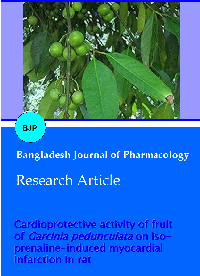Cardioprotective activity of fruit of Garcinia pedunculata on isoprenaline-induced myocardial infarction in rat
DOI:
https://doi.org/10.3329/bjp.v11i1.24941Keywords:
Cardioprotective, Garcinia pedunculata, Isoprenaline, Myocardial infarctionAbstract
The present study reveals the protective effect of Garcinia pedunculata aqueous fruit extract in isoprenaline-induced myocardial infarction in Wistar rats. Isoprenaline (200 mg/kg) administration subcutaneous once daily for two consecutive days significantly (p<0.01) increased the CK-MB, AST, ALT, ALP activity and CRP (p<0.05) levels. Pretreatment with extract (400 mg/kg) orally for 14 consecutive days significantly ameliorated the effect of isoprenaline by reducing the activity of CK-MB and the levels of ALP, SGPT respectively. No significant changes were seen in the case of SGOT activity and CRP levels. Severe necrotic lesions in the myocardial tissue were observed in isoprenaline-treated group. In extract-treated group, mild degenerative changes of myo-cardial tissues to nearly normal cytoarchitecture were seen. The results indicate the cardioprotective effect of G. pedunculata against isoprenaline- induced myocardial infarction rat model.
Downloads
370
308 Read
171
References
Bradly DW, Maynard JE, Emery G, Webster H. Transaminase activities in serum of long-term hemodialysis patients. Clin Chem. 1972; 18: 1442.
Bancroft JD, Gamble M. Theory and practice of histological techniques. 5th ed. Churchill Livingstone, 2002.
Comalada M, Camuesco D, Sierra S, Ballester I, Xaus J, Galvez J, et al. In vivo quercitrin anti-inflammatory effect involves release of quercetin, which inhibits inflammation through down-regulation of the NF-kappa B pathway. Eur J Immunol. 2005; 35: 58492.
Cusack MR, Marber MS, Lambiase PD, Bucknall CA, Redwood SR. Systemic inflammation in unstable angina is the result of myocardial necrosis. J Am Coll Cardiol. 2002; 39: 191723.
Dhalla N, Yates J, Naimark B. Cardiotoxicity of catecholamines and related agents. In: Cardiovascular toxicology. 2nd ed. New York, Raven Press, 1992. pp 23982.
de Bono DP, Simoons ML, Tijssen J, Arnold AE, Betriu A, Burgersdijk C, et al. Effect of early intravenous heparin on coronary patency, infarct size, and bleeding complications after alteplase thrombolysis: Results of a randomised double blind European Cooperative Study Group Trial. Br Heart J. 1992; 67: 12228.
Jordan JE, Zhao ZQ, Vinten-Johansen J. The role of neutrophils in myocardial ischemia-reperfusion injury. Cardiovasc Res. 1999; 43: 86078.
Kannan MM, Quine SD. Ellagic acid inhibits cardiac arrhythmias, hypertrophy and hyperlipidaemia during myocardial infarction in rats. Metabolism 2013; 62: 5261.
Jayaprakasha GK, Negi PS, Jena BS. Anti-oxidative and anti-mutagenic activities of the extracts from the rinds of Garcinia pedunculata. Innov Food Sci Emerg Technol. 2006; 7: 246-50.
Kagyung R, Gajurel PR, Rethy P, Singh B. Ethnomedicinal plants used for gastrointestinal diseases by Adi tribes of Dehang-Debang biosphere reserve in Arunachal Pradesh. Indian J Tradit Knowl. 2010; 9: 496-501.
Kumaran KS, Prince PS. Caffeic acid protects rat heart mitochondria against isoproterenol-induced oxidative damage. Cell Stress Chaperon. 2010; 15: 791806.
Patiri B, Borah A. Wild edible plants of Assam. 1st ed. Assam, The Director Forest Communication, Forest Department, Assam, 2007.
Panda VS, Naik SR. Evaluation of cardioprotective activity of Ginkgo biloba and Ocimum sanctum in rodents. Altern Med Rev. 2009; 14: 16171.
Priscilla DH, Prince PS. Cardioprotective effect of gallic acid on cardiac troponin-T, cardiac marker enzymes, lipid peroxidation products and anti-oxidants experimentally induced myocardial infarction in Wistar rats. Chem Biol Interact. 2009; 179: 11824.
Ravi Mundugaru, Febin Joy, Shrinidhi R, Lipika Das, Sudha-kara, Ravishankar B. Anti-inflammatory activity of aqueous extract of fruits of Garcinia pedunculata in experimental animals. Am J Pharma Tech Res. 2014: 4; 3.
Rathore N, Kale M, John S, Bhatnagar D. Lipid peroxidation and anti-oxidant enzymes in isoproterenol-induced oxidative stress in rat erythrocytes. Indian J Physiol Pharmacol. 2000; 44: 16166.
Sahu A, Das B, Chatterjee A. Polyisoprenylated benzophenones from Garcinia pedunculata. Phytochemistry 1989; 28: 1233-35.
Wilkinson J H, Boutwell J H, Winsten S. Evaluation of a new system for kinetic measurement of serum alkaline phosphatase. Clin Chem. 1969; 15: 487-95.

Additional Files
Published
How to Cite
Issue
Section
License
Authors who publish with this journal agree to the following terms:
- Authors retain copyright and grant the journal right of first publication with the work simultaneously licensed under a Creative Commons Attribution License that allows others to share the work with an acknowledgement of the work's authorship and initial publication in this journal.
- Authors are able to enter into separate, additional contractual arrangements for the non-exclusive distribution of the journal's published version of the work (e.g., post it to an institutional repository or publish it in a book), with an acknowledgement of its initial publication in this journal.
- Authors are permitted and encouraged to post their work online (e.g., in institutional repositories or on their website) prior to and during the submission process, as it can lead to productive exchanges, as well as earlier and greater citation of published work (See The Effect of Open Access).
